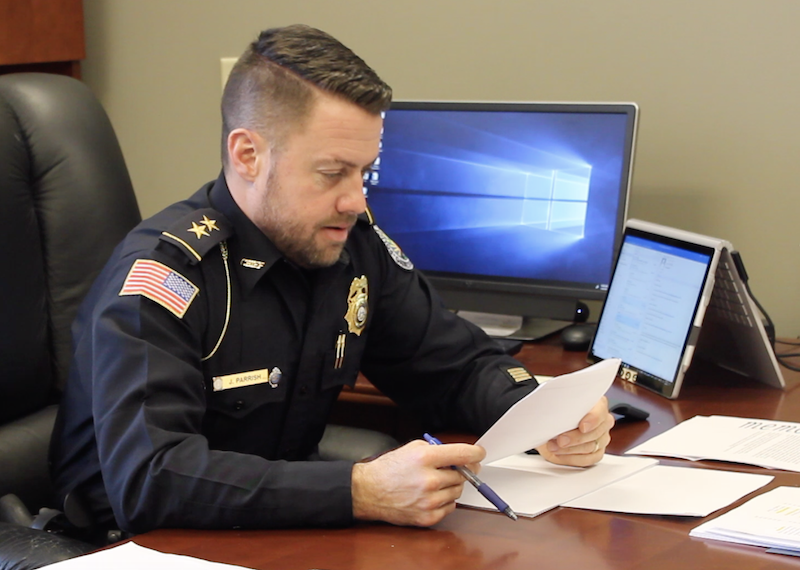In 1995, the U.S. population was roughly 150 million people with 600,000 mental health bed treatment facilities. Today, the U.S. population is more than 300 million people with 60,000 mental health bed treatment facilities.
Gainesville Police Chief Jay Parrish shared those statistics recently, saying the growing population and the reduction in treatment facilities is taking a toll on society and making the job of policing more difficult.
The overarching question is: Where are people getting help for seemingly invisible illnesses?
"Our issue is that our jails and our prisons have become the largest institutionalized mental health facilities, but our streets are the largest non-institutional,” Parrish said. “If you look around in any urban area, mental health is the plaguing underlying tone and the lack of accessibility of treatment.”
Last month, United Way of Hall County, an organization focused on health, education and financial stability to improve the lives of people in the community, announced a new “reach-out” campaign that highlights the importance of mental health.
"The stark reality is that while one in five people face mental health issues, less than 50% of those seek help. Our goal is to bring awareness to the prevalence of mental health issues and help us all understand everyone has a role to play in helping our community be healthier,” Jessica Dudley with United Way said in a recent news release.
The organization has worked alongside several local groups and individuals, including Parrish, who is a member of the Mental and Behavioral Health Community and board member of United Way. Parrish has used his position to work toward making major changes on the criminal justice side of mental health, where he has seen mentally ill people get “lost” in the system, he said.
“They get locked up, they finally get bonded out, and now, because they don’t have the mental capacity to know how to navigate the criminal justice system, they get caught-up in probation warrants out for them and failure to appear, so then they’re back in jail,” Parrish said.
Hall County has mental health court in place, but that program is used after the individual is charged with a crime, Parrish said. The chief’s goal is to connect those in need with resources instead of placing them under arrest.
“Many agencies around the country have hired social workers and licensed clinical workers into the police departments,” Parrish said. “I have told the board I envision a day where we have four or five clinical workers that are in the police cars, so that when we go to a call and we know it’s a patient in need of services, we can route that patient to services before the criminal activity and before they get arrested,” he said.
The stigma around mental health has changed drastically in law enforcement in the last 30 years, Parrish said. Today, officers undergo a substantial amount of training at the police academy in a course called “Mental Health First Aid,” which helps officers to identify the different illnesses they may encounter; in the past, officers were trained simply to make arrests in certain manic situations.
“[The class] talks about the different types of mental health, like what depression looks like, anxiety, schizophrenia, bipolar, it lists those spectrums out and some of the behaviors you could expect to see from those diagnoses,” Parrish said.
Crisis Intervention Training is another focus for the department, he said. CIT is a 40-hour class, completed as a collaborative effort with mental health experts, the GBI and local law enforcement. During the course, officers are taught deescalation tactics, like telling the individual the officers are there to help and not to arrest them. Roughly 70% of Gainesville’s police officers are trained in CIT, but the department is aiming for 100% in the future, Parrish said.
Despite the hefty amount of training officers undergo, no system is foolproof. During the training course, officers are corrected by an instructor and lack the adrenaline rush, self-critique and emotions of a real-life scenario, but that’s why each situation is approached by two officers, Parrish said.
“One is an observation officer and the other is a contact officer,” he said. “The observation officer can tell if it’s going the wrong way or if things aren’t working and they can step in as an independent and switch roles.”
The majority of mental health-related calls are domestic-related, where someone in a home may be suicidal or have threat tendencies, drug-related, loitering and present abnormal behavior, Parrish said. A lot of the times, the chief said, illnesses are left untreated – which sometimes stem from poverty, insurance and a lack of family support.
“Mental illness is illness, and illness left untreated leads to death,” Parrish said. “...I want to be able as a police agency, to deliver [mental health] services to them.”









